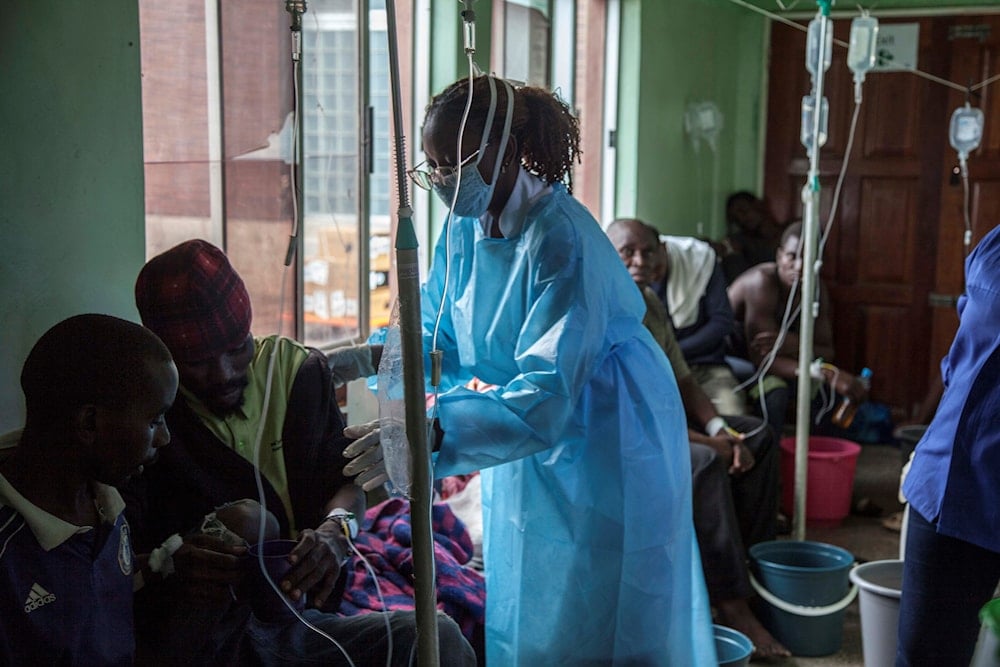Cholera outbreak puts Zambia on alert as fatality rate hits 4%
The Zambian government extends school shutdown with aims to maintain the spread of infections.
-

A health worker takes care of patients at a cholera treatment center in Lusaka, Zambia, on January 5, 2023 (AFP)
A major cholera outbreak hitting Zambia since October prompted authorities to extend the schools' shutdown after the recent holidays and to mobilize the National Disaster Management Agency.
In early January, the Zambian government declared that schools, originally scheduled to commence the academic year on January 8, would now commence on January 29. Parents and students were encouraged to utilize educational programs broadcast on public television and radio, drawing parallels with the measures taken during the COVID-19 pandemic.
Read more: Infectious diseases ravage through the Gaza Strip: OCHA warns
With 412 people dead and more than 10,413 infected cases recorded, the government transformed a large soccer stadium in the capital into a treatment center and opened up a mass vaccination program. It also said it is providing 2.4 million liters of clean water per day nationwide.
The majority of cholera cases are concentrated in the capital city of Lusaka. This stadium-now-health center is currently handling approximately 500 patients simultaneously.
'Devastatingly high number'
Cholera is a sudden-onset diarrheal infection caused by bacteria, usually transmitted through tainted food or water. The condition is closely associated with impoverished conditions and a lack of access to clean drinking water.
According to the Health Ministry, Cholera has been identified in approximately 50% of the country's districts and in nine out of ten provinces. The nation, which has a population of around 20 million, has been documenting over 400 cases on a daily basis.
"This outbreak continues to pose a threat to the health security of the nation," Health Minister Sylvia Masebo said, outlining it was a nationwide problem.
The recorded fatality rate was approximately 4% since the outbreak three months ago. The United Nations Children's Fund (UNICEF) described the fatality rate as "a devastatingly high number." Upon treatement, the infection has a death rate of less than 1%.
Not the first Zambian outbreak
Cholera outbreaks have occurred recently in several other Southern African countries, such as Malawi, Mozambique, and Zimbabwe. UNICEF has reported that Southern Africa has witnessed over 200,000 cases and more than 3,000 fatalities since the beginning of 2023.
In the previous year, the World Health Organization (WHO) disclosed that approximately 30 countries worldwide, including African nations like Nigeria and Uganda, experienced significant outbreaks in recent years.
Read more: WHO announces 18mln malaria vaccine doses for African countries
Zambia has experienced numerous significant cholera outbreaks since the 1970s, but according to Dr. Mazyanga Mazaba, the Director of Public Health Policy and Communication at the Public Health Institute, the current outbreak is the most severe in the past two decades in terms of the number of cases.
According to the Zambian Public Health Institute, 229 infected individuals passed before being admitted for treatment.
Water is the perfect medium for Cholera
The cholera bacteria can thrive for extended periods in warmer climates, and recent outbreaks in southern Africa have been exacerbated by unusually heavy rainfall and storms, according to experts.
The World Health Organization (WHO) reported last year that while poverty and conflict continue to be the primary factors driving cholera, climate change has played a role in the disease's increased prevalence worldwide since 2021, as it has led to more frequent and intense storms.
Read more: World remains vulnerable to new devastating pandemic: US report
In Zambia, heavy rains and sudden floods have transformed certain neighborhoods into waterlogged or soggy areas.
The health ministry said the country had received from the WHO around 1.4 million oral cholera vaccines, with 200,000 more expected to be delivered soon.

 4 Min Read
4 Min Read








